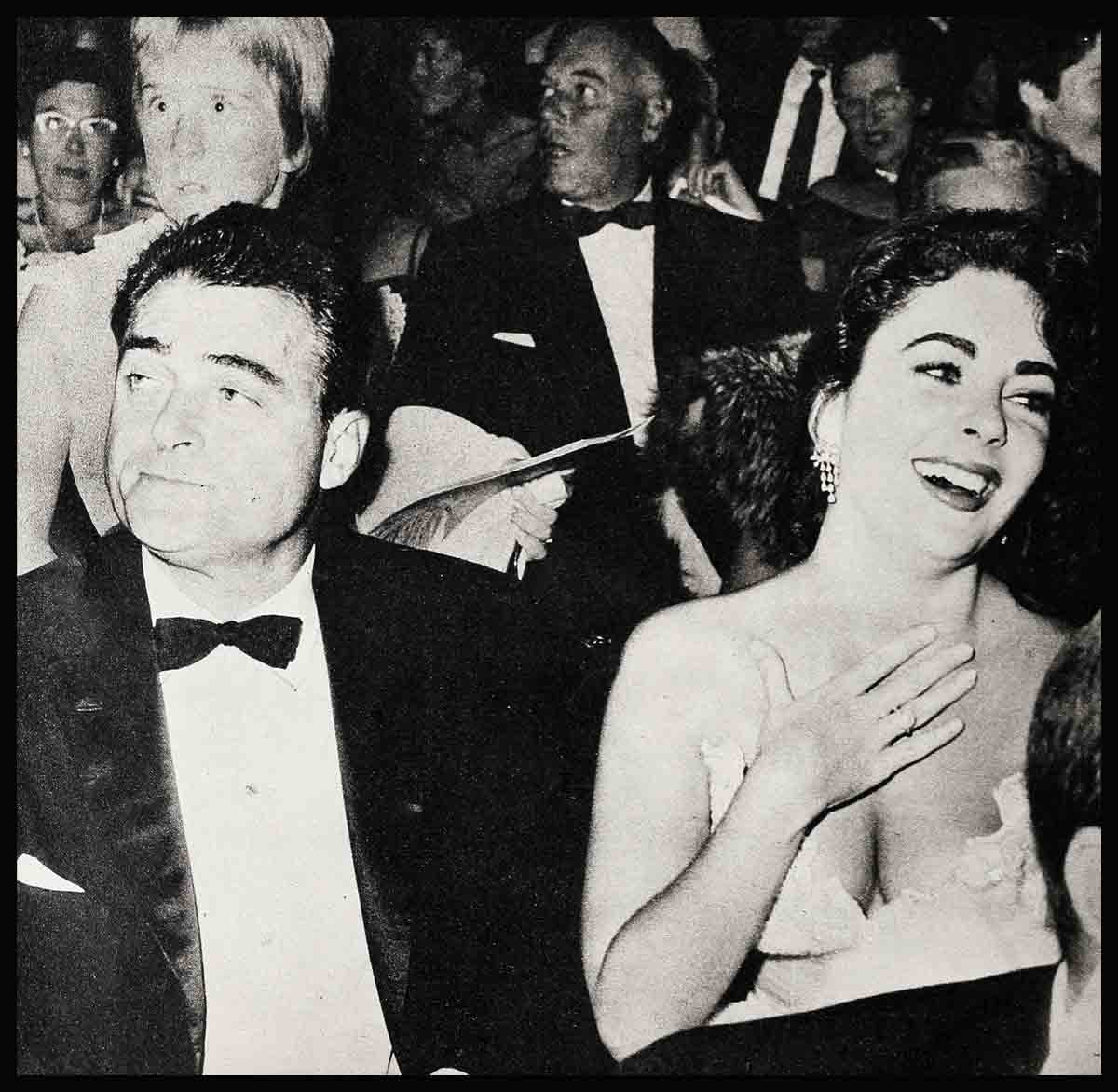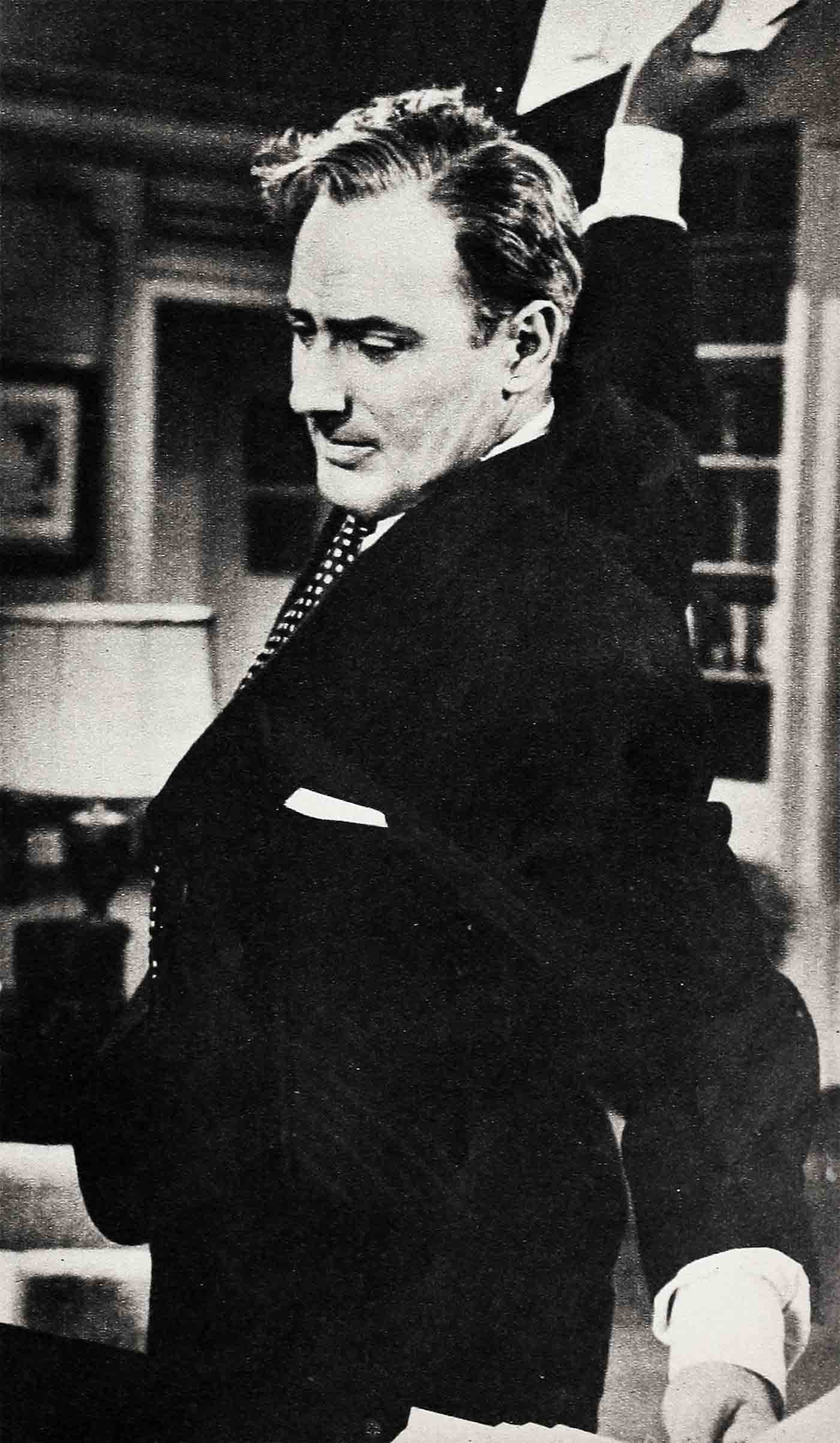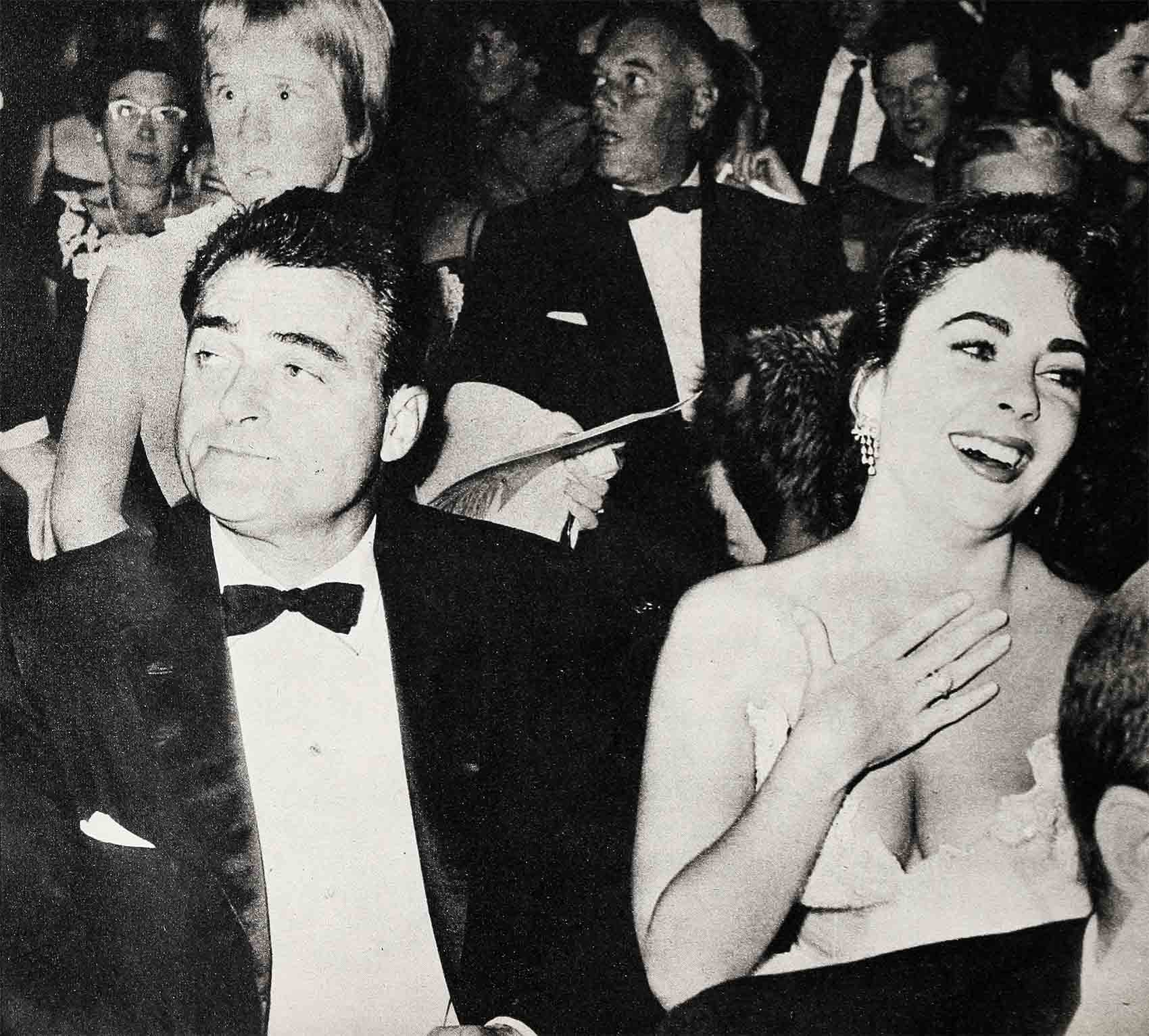
The Tragic Result Of Elizabeth Taylor’s Love Affair
The day he phoned Jean Simmons and Stewart Granger to tell them about the break-up of his marriage, Mike Wilding neither felt nor sounded like a beaten man. “Look,” he said brightly to Stewart, while Jean on the extension phone in the bedroom made little noises of shock and sympathy, “we’re old friends—you know this has been coming on for quite a while. But it isn’t as bad as it looks. It’s just a separation, really. I’m going to Sweden alone instead of with Liz, that’s all it really amounts to.”
Stewart cleared his throat. “Then why are you making an announcement to the papers?”
“Oh, that,” Mike said. “Well, you know Liz . . . Besides, I thought as long as I’m going to be away so long—and everything being so tense right now—it would be a good idea for Liz to—to get out a little, see other men, compare you know . . .” His voice trailed off, then became flip. “This way no one will send me anonymous letters about my wife.”
“Mike,” Stewart said.
Jean’s voice broke in. “Mike, I want you to do me one favor. When you get back from Sweden, come stay with us. We have plenty of room and we’d love to have you, wouldn’t we honey?”
“Oh, absolutely,” Stewart said. “You must come, old man, we’ll be—”
“Well, thanks,” Mike said. “It’s good of you both, I’m most grateful. But by the time I get back,
I’ll probably be ready to move home again, you know. Probably a little taste of being apart is all we need. Anyway, my father will still be at the house. Have to keep an eye on him. I’ll be going right home, I expect.”
There was a pause. Then Jean said brightly, “Of course. But if—by any chance—you don’t want to, Michael, you will come to us?”
“Sure. Sure, I’ll keep it in mind. And thanks again. I’ll drop you a line from Sweden.”
And a few days later at the airport, he put an arm tentatively around his wife’s rigid shoulders and tried to manage a smile for the photographers before he stepped on the plane.
But when Mike Wilding came back from Sweden, he didn’t go home. He took a taxi alone from the airport and checked in at a Beverly Hills hotel. Then he went up to his room and sat silently while the bellboy opened windows, turned on lights and taps, indicated the closets. When he was through, Mike opened his wallet and stuffed money into the boy’s hand. “No visitors,” he said. Then he got up slowly and crossed to the telephone, dialed a familiar number. “Mrs. Wilding, please,” he said formally.
A minute later she was on the other end. “Hello?”
“Hello, Elizabeth.”
“Oh, Michael. Welcome back. Did you have a good trip?”
“Very good, thank you. And you?”
“And me—what?”
“Did you have a good trip?”
“Trip? Oh, back from location. Oh, yes, thank you. Fine.”
There was a silence. Then Michael laughed. “At least it’s cheaper this way. Those phone calls from Sweden were beginning to mount up.”
“Michael, do you know, you’re crazy? You must have called me every day for a month. I can’t imagine what the bill—”
“I wanted to talk to you, Elizabeth.”
She laughed nervously. “Well, we had such bad connections and all—”
“It’s better now. When am I going to see you? I thought I might come out to the house. Sometime when it’s convenient . . .”
Silence. “Well, soon, of course. Very soon. I—I just have to look up my appointments and see—”
Michael stared hard at the wall for a moment. Then he said, “Fine, honey. You do that and let me know.” His voice was perfectly steady. “How are the kids?”
She sparkled. “Oh, just grand. It was so good to see them after being away. They’re just darling. They’re eating supper right now. Peas and lamb chops and mashed potatoes and cake—”
“It sounds good,” he said lightly. “I’m pretty hungry myself.”
The pause was not comfortable. “Oh, Michael, I—”
“Forget it,” he said. “How’s Dad?”
“Oh, marvelous. He’s looking wonderful—he’s getting tanner all the time. You should see him, he—” The voice came to a stop. “I’m sorry,” she said. “Everything I say seems to make it harder, doesn’t it?”
“It’s all right,” Michael said. “I expect neither of us is very good at civilized conversation yet. We’ll improve.”
“I suppose we will,” she said. “Michael, I have to hang up. It isn’t that I’m busy or anything. But I—I can’t take too much of this. It’s so awful.”
“I know,” he said softly. “Elizabeth, I wanted to tell you I—oh, not now. I’ll tell you when I see you.”
“I’ll make it soon, Michael. Really I will. I’ll call you. What hotel are you at?
He told her. “I’ll hear from you then. Good-by, honey.”
“Good-by, Michael.”

Someone pleasant, that’s all
He put down the phone and sat for a minute with his head in his hands. Then he started up again, and dialed his agent. “Art? Mike. Yes, I got in an hour or so ago. Fine—fine. Yes, I spoke to her. Fine. Oh—I’ll see her soon. I’ve got a few things to do first. Look, Art—I wanted to ask you—you still have that little red book of yours?” He laughed briefly. “Mine’s a few years out of date, you know.” He listened a moment. “No, no one special on mind. I just—thought I ought to be seen around a bit. Can’t let Elizabeth get all the publicity, you know . . . No, no preferences. Someone pleasant, that’s all . . . I mean, it’s mostly for career purposes, after all. Til probably be going home again on not too long. Yes, of course. But in she meantime—” Ten minutes later he hung up. He had half a dozen numbers on a scratch pad in front of him. He set his jaw grimly and began to dial. From his face you’d have thought he was performing a duty that had to be gotten through, no matter how painful. But his voice was light. He introduced himself, laughed, talked, said yes, Ingrid Bergman had taught him a bit of Swedish while he was there, obliged with a few words. He never had to put the phone down without success; when he was through he had a date for every night in the week. Two with Peggy Connolly who sounded lice and rather—sympathetic. He wondered riefily if she was really carrying the torch for Frank Sinatra or if that was just talk. Then there was Marie McDonald. And a girl named Gina Martin. And a couple of others. A full schedule, he thought, for a man who went—according to the papers—for pipe and slippers lightly.
Then he stood up. He walked to the window, pulled the curtain aside, and stared down at the busy Hollywood street. He turned and walked restlessly around the room. He looked at his watch. He thumbed through a magazine, then dropped at on a chair. He strode hatless out of the room and down to the street.
No marquees for Mike
An hour later, he was back. He had seen no one, talked to no one. He had had a drink and bought a paper. He had walked past the marquees of a dozen movies and had not gone in. Every one had friends of his in it—friends of his and Liz. He didn’t feel like watching them go through their paces. There were no marquees with his own name on them, of course. It had been a long time since that was a regular sight—Michael Wilding in . . . A long time since the papers called him the best light comedian in movies. According to his agent, it would be a long time before it happened again, even if he would work abroad now, go back to the light comedies that had made him famous. He couldn’t drop out of sight for practically four years, his agent told him, without feeling it. Mike had insisted on joining Elizabeth in Hollywood, the agent continued, and refused to go back to England for the kind of movies that Mike did best. What could Mike expect to happen? Anything other than what did happen? When Mike attempted to interrupt, the agent’s voice kept right on—sure he understood, Mike wanted to stay with Liz. Sure he knew Liz was sick . . . sciatica, neuritis, disc syndrome, bad legs, shoulders, arms, feet—and all the doctors said it was psychosomatic. Did Mike have to play nursemaid everytime?
“Yes,” Mike had answered him—flatly.

Mike learns about Mike Todd
He lay down on the bed and opened the paper. He turned a page or two, and there she was, laughing and lovely, her pretty mouth smiling at the camera and her dark eyes shining up at the man beside her. Mike stared at the picture for a moment, then deliberately moved his eyes to the caption. Lovely Elizabeth Taylor with her constant escort, Mike Todd. At the Mocambo last night, Miss Taylor admitted that she is “passionately in love.”
He crumpled the paper in his fist. His fingers flickered over the phone dial again.
“Let me speak to Mr. Wilding,” he said.
“I’m sorry, sir,” the maid answered, embarrassed. “Mr. Wilding doesn’t—”
“Not that Mr. Wilding,” Mike barked. “The elder Mr. Wilding.”
“Yes, sir, I’m sorry.” The phone tumbled down. Then a voice, the voice of an eighty-two-year-old man. “Yes?”
“Dad, it’s Michael.”
“Oh, Michael. Michael, I’m so glad you called. I was going to get your address from Elizabeth, but she’s gone out and I—”
“It’s all right, Dad. How have you been?”
They talked for ten minutes. Heartbreak was in every tone of his father’s voice. He adored Elizabeth, he had been happy in their home, then utterly stricken at the sight of the marriage dissolving before his eyes. But he told Michael about the boys, about his tan, about his health, about being glad he was home again. Then, run down he stopped and Michael filled the void.
“It’s important to Liz”
“Look, Dad, I wanted to ask you something. I read—I don’t know if you’d know, of course—and probably I shouldn’t drag you into this at all—but I don’t know where else to go. Do you know—is this thing with Mike Todd anything to Elizabeth?” He held his breath.
And from the other end came the tired old voice. “I—don’t know, son. She sees a lot of him. She looks—I don’t know how to put it—happy. I couldn’t say for sure; she hasn’t told me. But if you just want my opinion, I must be honest. I would say, yes, it is very important to Elizabeth.”
Michael let his breath out slowly. “All right. Thank you. I’ll call you tomorrow, Dad. I’ll make—arrangements for everything. Don’t worry. And thanks.”
Then he clicked down the receiver and picked it up for the last time, dialed again. “Jean? . . . Michael. I was thinking about that invitation you and Stewart gave me before I left. If it still holds—I’d like to come.”
Ten minutes later he put down the phone. Now he’d get a taxi and take his suitcases over to the Grangers. He’d move into the guest room and stay: In a few days he’d start looking for a house—a place he could bring his father. A place his sons could come—for week-end visits. A place to be lonely in. Till then he’d stay at the Grangers’, and they’d cheer him up and be good to him. They were good friends. He was lucky to have good friends.
He gasped suddenly and put his head in his hands. If you didn’t know it was Mike Wilding, a strong man, a wordly man, a man with little patience for those who indulged in self-pity, you might have thought the man by the telephone was crying.
THE END
—BY SUSAN WENDER
Mike Wilding can currently be seen in Columbia’s Zarak and will soon be seen in RKO’s Long Live The King.
Elizabeth Taylor can currently be seen in George Stevens’ production of Giant, a Warner Bros. release. Watch for her in MGM’s Raintree County.
It is a quote. MODERN SCREEN MAGAZINE MARCH 1957




